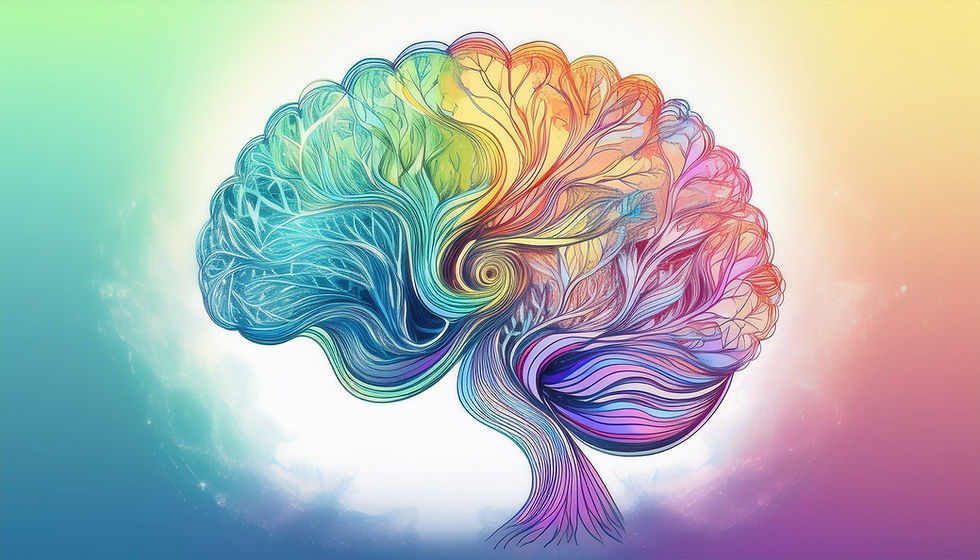When You Feel Triggered: Parenting from a Response, Not a Reaction
- Savy Hester

- Jun 20
- 3 min read
You’re doing your best. You plan the days, buy the sensory toys, advocate through meetings, cook the special meals—and still, sometimes it feels like your child doesn’t see any of it.
They cry over the “wrong” spoon. Yell when you try to help. Meltdown after getting something they asked for.
And somewhere in your brain, a thought flickers: “Why are they being so ungrateful?”
Let’s pause and look closer.
"Triggered" Isn’t Just a Buzzword
When we say we’re triggered, we mean this: Something in our present moment is lighting up a reaction in our brain and body that was built during a past experience.
This is called emotional memory, and it’s part of the brain’s survival system. If you grew up feeling unseen, unprotected, or constantly walking on eggshells, your brain may now react strongly to any moment that feels even slightly similar.
You may not consciously be thinking about your childhood. But your nervous system is reacting as if you’re back there, being dismissed or criticized. And now that response is showing up in the present—at your child.
That’s not a moral failure. It’s a neurological process. But understanding it gives us back our power to choose a different response.
What Is Trauma Really?
Let’s define it clearly:
Trauma isn’t just about big, catastrophic events. It’s anything that overwhelms our ability to cope, leaves us feeling alone in our distress, and changes how our body and brain respond to future stress.
So if you were constantly punished for “talking back,” or made to feel selfish for having needs, or rewarded only when you were quiet and compliant—your body may now overreact when your child is loud, resistant, or upset.
That’s not weakness. That’s programming.
But now, as parents, we have the opportunity to reprogram—starting with how we interpret behavior.
Autistic Kids & Gratitude: The Developmental Disconnect
Your autistic child isn’t being ungrateful. They may not even understand what you did that cost time, money, or effort.
Here’s why:
Gratitude is an abstract concept.
Abstract thinking develops later in typical kids, and often much later in autistic kids.
Many autistic children link emotions to events, not effort. So if they liked the item but hated the store experience, their emotional memory is negative—no matter the price tag.
And here’s the kicker: autistic children often cannot hold two emotional truths at once yet. They can’t think, “That was overwhelming but Mom did something nice.”
So if you're waiting for appreciation in the form of smiles or kind words in that moment… you may not get it. Not because they’re ungrateful. Because they literally can’t do both.
Dysregulation Means They Can’t Self-Control
We often assume kids “won’t” behave, but most of the time, it’s that they can’t yet.
Dysregulation is when the nervous system is in a heightened state and unable to return to calm without help. It’s when emotions take over executive function—the brain’s “thinking and planning” center—and behaviors become reactive, not intentional.
Think of it like this: your child’s boat is taking on water, and they toss you the rope to help anchor them. If you’re stuck in your own storm—your own trigger—you might not even see the rope.
Worse, you might throw it back.
That looks like:
“Stop acting like this right now.”
“I just bought that for you, and this is how you act?”
“You’re embarrassing me.”
We don't say these things because we're bad parents. We say them because we’re overwhelmed too.
But when we let our reactivity lead the moment, we model stress, not safety. And we accidentally teach them that their big feelings make us unsafe.
Start Rewriting the Internal Script
Here’s a starting point:
Instead of:
“They’re being ungrateful.” Try: “They’re overwhelmed. They can’t access gratitude right now.”
Instead of:
“They don’t care what I do for them.” Try: “They don’t yet understand what I do. That understanding will come later, with safety and time.”
Instead of:
“They’re manipulating me.” Try: “They’re dysregulated. They’re trying to get a need met with the tools they have.”
You’re not just parenting a child—you’re co-regulating a nervous system still learning the basics of self-control, communication, and emotional organization. That’s heavy. That’s sacred. And it means your reactions matter more than your plans.
Final Thought: You Can't Anchor a Child While You're Floating
Before you respond to a behavior, check in:
What story am I telling myself about this?
Is this a pattern from my own past?
Can I pause before I pass that feeling down?
There’s no perfection in this work. But there is power in awareness. And every time you choose to anchor instead of explode, you hand your child a lesson far more valuable than a toy or reward:
“Even when I’m overwhelmed, I don’t make you carry my storm.”





Comments